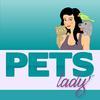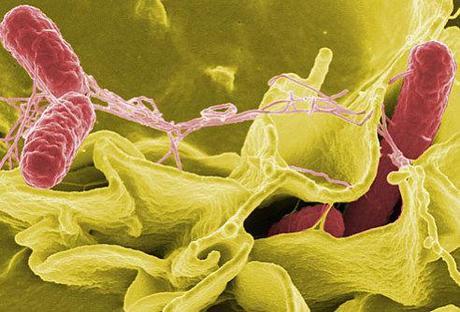 Salmonella bacteria: image via webmd.com
Salmonella bacteria: image via webmd.com
The most recent splash of pet food recalls, particularly of the foods manufactured at two of the Diamond Pet Foods plants, are not the first, and will not be the last, pet food recalls. Aside from avoiding the particular pet foods that have been recalled, there are several things that you can do to prevent Salmonella infection and any other nasty bacteria that may enter the pet food supply.
First, though, you should understand that most dogs and cats in good general health may carry salmonella bacteria and not show any signs of illness. Their digestive systems have to deal with all kinds of bacteria - I hate to use this example, but think of how many dogs eat other dogs' poop and cats that eat rats and other bacteria-carrying creatures, like birds....
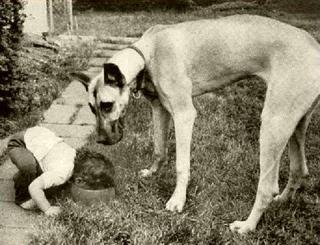
Here are several things you can do to prevent you and your pets from suffering the horrible effects (nausea, vomiting, diarrhea, severe dehydration, headaches, dizziness...) of salmonella poisoning.
Stay Informed
1. Check the FDA Recall List frequently for additions to recalls of dog and cat foods. Regarding those foods manufactured by Diamond Pet Foods, there are a few pages you can link to from its original Recall Information page. An outstanding source of recalled foods all over the world, pet and human, is the website eFoodAlert, and if you subscribe to its newsletter, you will get this information delivered to you for free, in your email box daily.
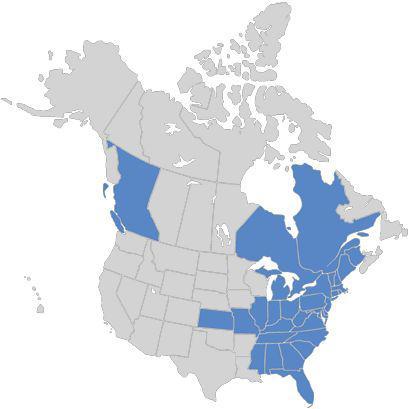
Keep Clean
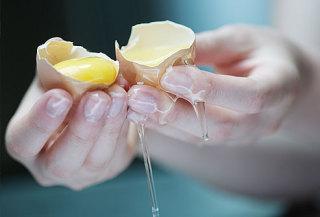
3. Wash your hands after touching your pets and, if they are lovable lickers, wash your face when they are finished licking you. Don't let them lick your mouth; I don't care how much you love them. Frequently wash their bedding and use bleach to disinfect kennels and eating areas.
4. Turtles, snakes, and various exotic animals are known carriers of salmonella, and the bacteria may be active on any part of their bodies, so be especially conscientious about keeping their habitats clean and, of course, before and after contact with them.
Monitor Your Pet's Diet
5. This one should be obvious: Don't Feed Your Pet Recalled Pet Food; stop feeding it right away. See the sources for this information under number 1, above. If your pet is eating a food that has been recalled but your batch has not been recalled, you can continue feeding the food or, if you are becoming anxious about the brand, you can slowly switch over to an unaffected brand of food over a period of two weeks, slowly adding the new brand into your pet's current food more and more each day, so his system has a chance to get used to it.
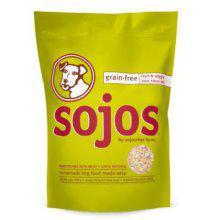
Know The Symptoms Of Salmonella
7. Vomiting, diarhea, bloody stool, dehydration, fever, abdominal pain, fatigue, and loss of appetite are all signs of salmonella in animals and humans. If you observe any of these symptoms in combination, or isolated for more than a day, call your vet immediately. A lab test can be done to check for salmonella (about $60), but it will only show a presence or absence of the bacteria. It won't tell you what strain of salmonella is present and it won't tell you how much of the bacteria was found in a stool sample. For that information, your pet will need more specialized tests.
8. If the above symptoms resemble anything you have suffered before, than you might have had salmonella or other type of food poisoning, or you may have had a horrible flu. Salmonella poisoning has severe symptoms in people, especially infants, children, elderly persons or those with otherwise-compromised immune systems.
Know The Treatments For Salmonella
9. Symptoms of salmonella are the same in humans and animals, and the
treatments are very similar too. But acute salmonella poisoning in a pet is an
emergency situation. Don't give your pet any food or water by mouth; the
vet will likely give her intravenous fluids and electrolytes to restore her
energy and re-hydrate her. Antibiotics may or may not be prescribed, depending
on the severity of the symptoms; however, the salmonella bacteria is known to
adapt itself easily to antibiotics, so it will likely be a short term
dosage.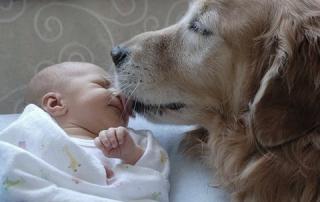
Don't mess around with any kind of food poisoning. If in doubt about the
severity of your pet's or your own symptoms, seek emergency
support.
Sources: Center for Disease Control & Prevention, eFoodAlert, Fifi & Fido, Food Safety News, WebMD, PetSumer Report. Personal Interviews with Dr. Karen Perry, DVM, Advanced Care Veterinary Hospital, and store manager of well-known national pet store (who asked for anonymity).
Resources for readers: eFoodAlert, Fifi
& Fido, PetSumer Report, FDA
Recall List, Diamond Pet Foods
That's the buzz for today!
